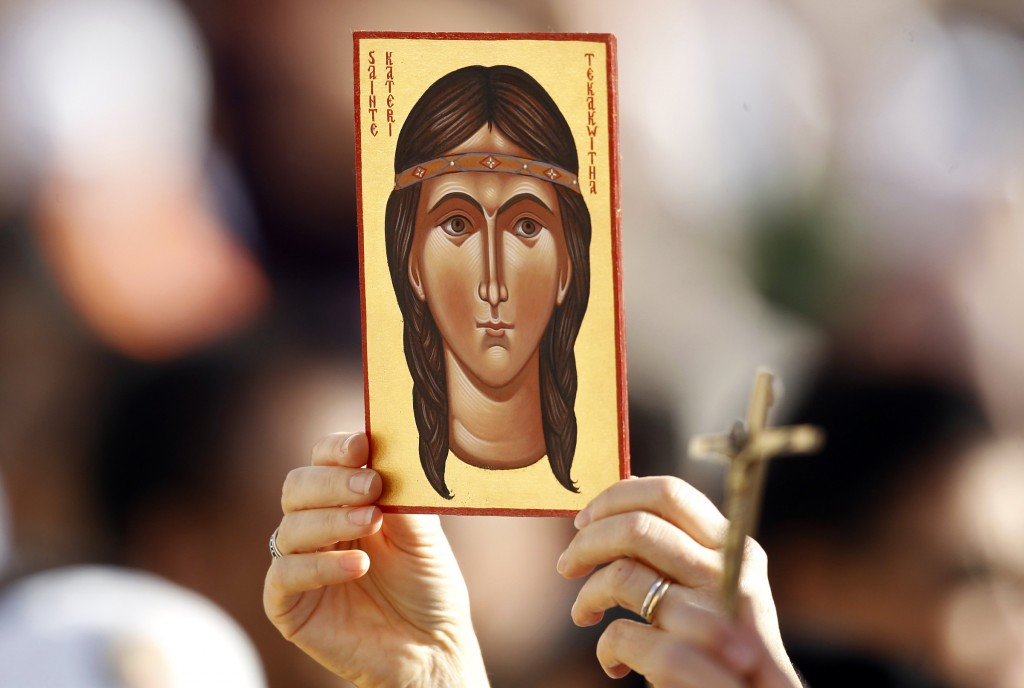
By Andy Sparke
Nearly 600 Native American Catholics from 37 states joined in the annual Tekakwitha Conference gathering in El Paso July 17-22.
Participants from Maine to Oregon, Florida to California, attended the annual four-day event that was held in the El Paso Convention and Performing Arts Center.
Named for St. Kateri Tekakwitha, who was canonized in October 2012, the Tekakwitha Conference was originally founded to help indigenous Catholics “reinforce Catholic identity” while at the same time affirming “pride in our cultures and spiritual traditions,” which are “special gifts” to the Catholic Church, said Sister Kateri Mitchell, a Sister of St. Ann, who is the conference’s executive director.
This year’s gathering was the second to be hosted by the Ysleta del Sur Pueblo of El Paso’s Tigua Tribe.
Keynote speakers at the gathering focused on the relationship of Native American cultural activities and the transformative nature of sacraments in the Catholic Church.
Conventual Franciscan Father Miguel Briseno, pastor of Our Lady of Mount Carmel Parish, delivered the keynote address of the opening day of the convention. His parish is the location of the 17th-century mission of San Antonio de la Ysleta del Sur, which is the home parish of the Tigua Tribe.
He focused on the relation of traditional tribal breads and the Eucharist and its meaning for the lives of individual Catholics.
Father Briseno said we are like “the grains of wheat that are formed into a loaf that is baked into bread through the warmth of God’s love.”
“That love is not just a warm, fuzzy feeling,” he said. “It is an act of will, a choice. God chose to love us, and we choose to love God.”
He illustrated God’s continuing love and concern for people by citing stories from the Old and New Testaments leading up to the Last Supper.
Quoting from St. Augustine, he said in the Eucharist “we become what we receive.”
There is a “mystery of transformation that must take place,” he said.
Unlike ordinary food which becomes part of us, he said, in the Eucharist we become one with Christ.
When the church gathers for the Eucharist, “God’s love is revealed in us, we change direction,’ he said.
Through the Eucharist, he said, we are called to the mission of bringing Christ’s love to the world.
Augustinian Father Bob Dueweke, director of the El Paso Diocese’s Tepeyac Institute, outlined a connection between the Ysleta del Sur Pueblo’s traditional corn dance and the sacrament of baptism.
The dance is a sign of the unity of the tribe in praying for rain to bring new life to the earth, he said, and through the waters of baptism we gain “identity as people of faith in Christ and called to spread his love and compassion to the world.”
He noted that the Gospels tell the story of Jesus being “catapulted into his ministry of compassion and love” at his baptism in the Jordan.
The word Satan, he said, means “the accuser” and we feel the accusation of being unworthy. “Baptism wipes away the accusation with the new exhortation ‘you are loved,” he said.
The sacrament contains the “original grace of an intimacy with Christ to move humanity toward a new creation,” he said. “It propels us toward mission.”
Among those who welcomed participants to the gathering were El Paso Bishop Mark J. Seitz, newly installed to head the diocese, and Philadelphia Archbishop Charles J. Chaput, episcopal moderator of the Tekakwitha Conference. The archbishop, a Capuchin Franciscan, is a member of the Prairie Band Potawatomi Tribe.
Others welcoming attendees were Tigua Tribal War Capt. Javier Loera; Pierre Solet, chairman of the Tekakwitha Conference’s board of directors; Sister Mitchell; conference board members; Tigua tribal council members and the event’s planning committee.
The agenda included 22 workshops on Catholic theology, Native American spirituality, as well as meetings of the representatives from the conferences 6 districts throughout the United States.
On the final day of the conference, participants traveled to the nearby Ysleta del Sur Pueblo on the Tigua reservation for a meal, closing liturgy celebrated by Bishop Seitz, and a procession of the traveling St. Kateri image, statue and relic that will be handed over to the 2014 planning committee.
Next year’s conference, which will be the 75th annual gathering, will be in Fargo, N.D. – CNS